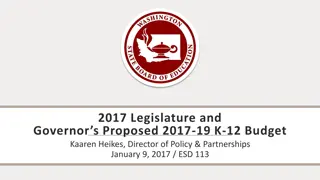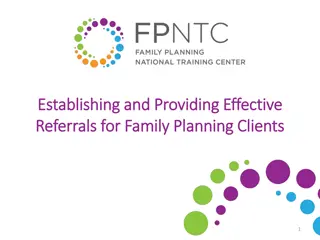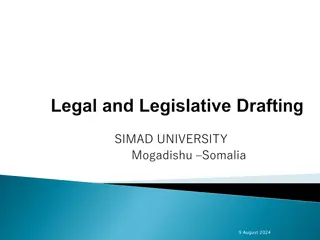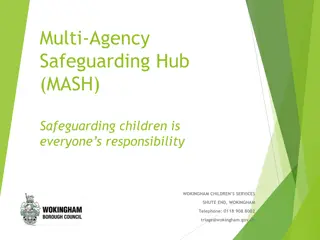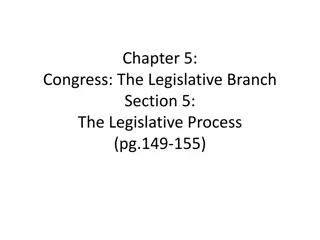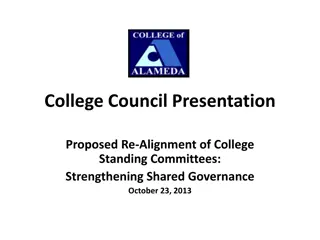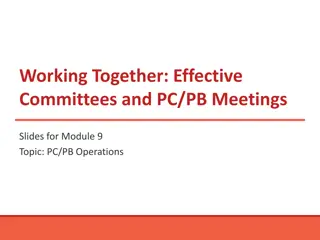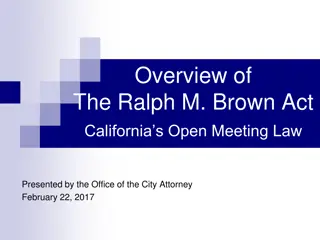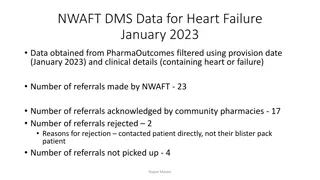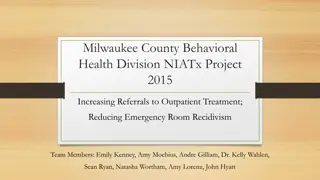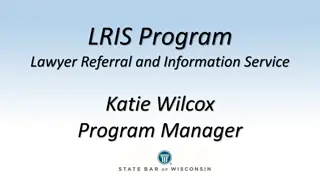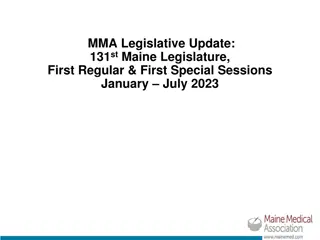Understanding the Process of Legislative Referrals in AS Committees
The process of legislative referrals involves submitting issues or legislation for discussion, debate, and development in AS Standing Committees through a formal method. This includes submitting a legislative referral, assigning it to a committee, researching the topic, making recommendations, and voting on final actions. The lifecycle of a legislative referral outlines the steps from submission to committee action or decision, emphasizing the role of Senators in researching and providing updates. Referrals not completed by the end of the semester are carried over to the following semester.
Download Presentation

Please find below an Image/Link to download the presentation.
The content on the website is provided AS IS for your information and personal use only. It may not be sold, licensed, or shared on other websites without obtaining consent from the author. Download presentation by click this link. If you encounter any issues during the download, it is possible that the publisher has removed the file from their server.
E N D
Presentation Transcript
Legislative Referrals Research, Discussion, Debate and Development
What is a Legislative Referral? A legislative referral is the method by which issues or pieces of legislation are formally accepted and directed to one of the three AS Standing Committees for discussion, debate and development.
Submitting a Legislative Referral If a Senator has an idea for an issue to work on in committee, they are required to put the issue or request in writing. The legislative referral template is available on the AS webpage under forms.
Legislative Referral Template and Log Legislative Referral Template Legislative Referral Logs
Sample Referrals External Affairs - Expansion of CalFresh Benefits Internal Affairs - Senate Incentives University Affairs - Mental Wellness Campaign
Lifecycle of a Legislative Referral A referral is submitted on the AS webpage. The AS President, Attorney General and Government Secretary will receive notification that a referral has been submitted. The referral is read at the next Senate meeting and is assigned to a Standing Committee for research by the AS President. The Government Secretary will assign the referral a number and forward a copy to the AS President, Vice President, Attorney General, and Committee Chair. The Attorney General will update the Legislative Referral Log with the appropriate referral number and committee assignment. The Committee Chair will place the referral on the next meeting agenda to begin discussion.
Lifecycle of a Legislative Referral - Continued Once a referral is in committee, it will be assigned to a Senator or group of Senators to research. Assigned Senators are responsible for researching the topic and providing regular updates to the committee. Once the topic has been researched thoroughly, the assigned Senators will make a recommendation to the Senate for a final action. The committee may also decide to table a referral indefinitely and not proceed with any action. A legislative referral can result in of the following actions: 1. Policy 2. Referenda 3. Report 4. Resolution The committee will vote on a position on the final product of their deliberations and move the item from the committee to the Senate for a final vote. All legislative referrals that do not pass out of committee by the end of the semester will die in committee and must be referred again the following semester.
Policy A policy is a definite course or method of action selected to guide and determine present and future decisions. Policies can be written by students and/or staff. In the past, policies have been written to outline the use of corporate credit cards by staff, to determine the AS relationship to the Women s Center, and countless others. The main characteristic of a policy is that it conforms to the definition set above it must be written to define a definite course or method of action to guide and determine present and future decisions.
Referenda A referenda is the submitting of legislative measures to the votes for approval or rejection. Referenda can be written by any Senator or Standing Committee, but the final referenda language must be approved by the Senate prior to its placement on the ballot. Referenda must be approved by the Senate no less than 28 calendar days prior to any AS election.
Report A report is a written document that outlines research conducted and collected on a specific topic. Its most important aspect is conclusions and recommendations based on the research presented. A well-written report will outline several courses of action that are possible based on the information collected and will make a recommendation on the best course of action. The Senate may approve the recommendation as presented, approve a different aspect or recommendation of the report, refer the report to another body for further discussion/action, accept the report without action, return the report to committee for further consideration, or reject the report.
Resolution A resolution is a formal statement expressing the opinion, will or intent of a body of persons. Resolutions express the formal stance of the Associated Students. They can be written by individuals or developed by a committee. A resolution expresses two things a statement of an issue or problem, and the AS response to that issue or problem. Resolutions can be an official commendation for an action or achievement; they can be a call to action or a request for a specific change; or can express AS opposition to a particular issue or action. Resolutions are binding upon all future Associates Students Senates and can only be repealed by a formal action of the Senate. They are the most powerful and long-term way AS has of letting the campus administration and student body know the stance of the Associated Students on a particular action.
Sample Resolution SB-2020-21-008: Condemning the Rise of Hate Crimes Against Asian Americans
Helpful Links How to Write a Resolution Archived Resoultions Current Resolutions (2017-Present) Resolution Template Recommendation Template
Need Assistance? The Student Leadership staff is always available to assist you throughout the legislative process. Patrick Bailey, Executive Director patrick.bailey@csun.edu Kevin Mojaradi, Interim Coordinator for Student Leadership Kevin.mojaradi@csun.edu Denisse Ibarra, Government Secretary denisse.ibarra@csun.edu


